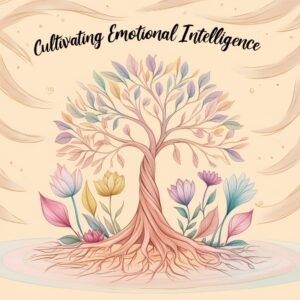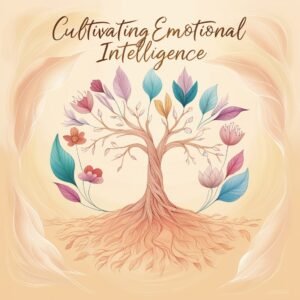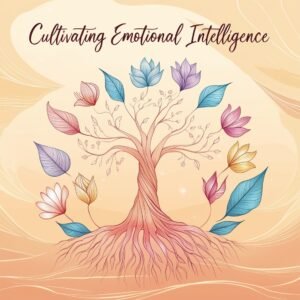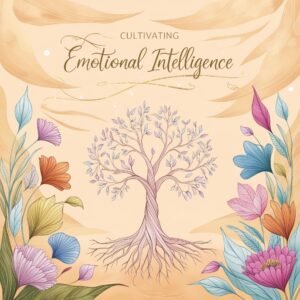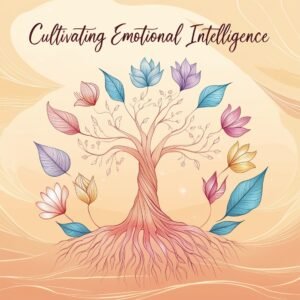Cultivating Emotional Intelligence:
Cultivating Emotional Intelligence: Your Guide to Personal Growth
Ever wondered why some people effortlessly connect with others while managing life’s ups and downs with ease? The secret often lies in their emotional intelligence (EI). Unlike IQ, which measures how well you solve problems or analyze data, EI is all about understanding emotions—yours and others’. And the good news? It’s something you can develop with practice. Let’s explore how improving your emotional intelligence can transform your relationships, career, and overall well-being.
What Exactly Is Emotional Intelligence?
At its core, emotional intelligence is the ability to recognize, understand, and manage emotions—both your own and those of others. It involves four main skills:
- Self-awareness: Knowing what you’re feeling and why.
- Self-regulation: Keeping your emotions in check and staying adaptable.
- Empathy: Understanding the emotions of others and responding appropriately.
- Social skills: Building and maintaining strong, meaningful connections.
These skills are the foundation for managing stress, improving communication, and navigating conflicts effectively.
Why Does Emotional Intelligence Matter?
In today’s fast-paced world, emotional intelligence is more than just a buzzword—it’s a game-changer. People with high EI tend to handle stress better, build stronger relationships, and even excel in their careers. Unlike technical skills or book smarts, emotional intelligence helps you connect on a human level, which is invaluable in both personal and professional settings.
How to Build Emotional Intelligence
Let’s dive into some practical ways to enhance your emotional intelligence and take your personal growth to the next level.
1. Get to Know Yourself (Self-Awareness)
You can’t manage what you don’t understand, right? That’s why self-awareness is the first step.
- Reflect regularly: Take a few minutes each day to think about your emotions and what triggered them.
- Keep a journal: Writing down your feelings can help you spot patterns over time.
- Ask for feedback: Sometimes, others see things about us that we don’t. A trusted friend or colleague can offer valuable insights.
2. Master Your Reactions (Self-Regulation)
We all have moments when emotions threaten to take over. The key is learning to pause before reacting.
- Breathe deeply: A few deep breaths can instantly calm your mind.
- Set boundaries: Protect your emotional energy by avoiding toxic situations when possible.
- Practice mindfulness: Being present helps you stay grounded and reduces impulsive reactions.
3. Step Into Someone Else’s Shoes (Empathy)
Empathy isn’t just about feeling bad for someone; it’s about truly understanding their perspective.
- Listen more: Give people your full attention without planning your response while they’re talking.
- Ask thoughtful questions: Instead of assuming, ask how someone feels or what they need.
- Imagine their experience: Try to see things from their point of view. This simple habit can change the way you connect with others.
4. Boost Your People Skills (Social Skills)
Whether you’re leading a team or simply chatting with a friend, strong social skills make all the difference.
- Communicate clearly: Be honest and direct while remaining respectful.
- Show appreciation: A simple “thank you” or compliment can go a long way.
- Handle conflicts calmly: Approach disagreements as opportunities to collaborate rather than win.
5. Build Resilience (Emotional Strength)
Life isn’t always smooth sailing. Emotional resilience helps you bounce back from setbacks with greater ease.
- Focus on the positive: Instead of dwelling on what went wrong, think about what you can learn.
- Take care of yourself: Make time for activities that recharge your energy, like exercise, hobbies, or quiet time.
- Stay flexible: Embrace challenges as opportunities to grow rather than obstacles to avoid.
How to Track Your Progress
Developing emotional intelligence is a journey, not a one-time fix. Here’s how to know you’re moving in the right direction:
- Self-check-ins: Regularly ask yourself, “How well did I handle that situation?”
- Feedback from others: Pay attention to how people respond to you—are your relationships improving?
- Noticing change: See if you’re reacting more calmly or connecting with people on a deeper level.
Where Can You Use Emotional Intelligence?
Here’s the exciting part—emotional intelligence isn’t just for personal development. It has practical benefits in almost every area of life:
- At work: Strong EI helps you collaborate better, resolve conflicts, and even lead more effectively.
- In relationships: Understanding and managing emotions leads to healthier, happier connections.
- For stress management: Emotional intelligence equips you with tools to stay calm and clear-headed during tough times.
Common Myths About Emotional Intelligence
- “You’re either born with it or not.”
Like any skill, emotional intelligence can be learned and improved. - “It’s all about being nice.”
Not exactly. EI is about understanding emotions—not ignoring boundaries or avoiding tough conversations. - “It’s more important than IQ.”
Both are important. IQ gets you in the door, but emotional intelligence helps you thrive once you’re there.
Resources to Help You Grow
Ready to take your emotional intelligence to the next level? Here are some tools to get started:
- Books: Check out Emotional Intelligence 2.0 by Travis Bradberry for practical tips.
- Online courses: Platforms like Coursera and LinkedIn Learning offer classes on EI.
- Apps: Try apps like Moodfit or Headspace for mindfulness and emotional awareness exercises.
Final Thoughts
Emotional intelligence is like a superpower for personal growth. By understanding your emotions, managing your reactions, and connecting with others more deeply, you’ll unlock a new level of success and happiness.
So, start small. Reflect on your emotions, listen more intently, and practice empathy in your daily interactions. Over time, these habits will become second nature, transforming the way you relate to yourself and the world around you.

